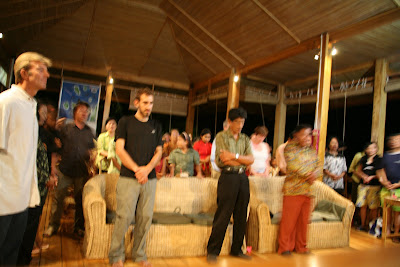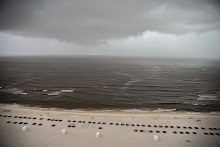
"Visit In-donesia!" That's the slogan for the Indonesian Tourism Association's latest television advertising campaign. And so, we did. We left Cambodia, excited to embark on our diving adventure, a part of the trip we had looked forward to since first planning it a year and a half ago. We flew from Phenom Penh to Manado by way of Kuala Lumpur. We spent the night sleeping on our thermarests in the airport. On the plane we met an American, and that was exciting for once. We started talking to him because Max asked him for the front page of his newspaper showing Bush being "shoe-d" by an Iraqi journalist. It made the moment all the sweeter to share it with an fellow countryman. Later, some thousands of kilometers away, we met this American on a remote island. More about that later.
Manado: Manado is an old Dutch port town on the northeastern tip of Sulawesi, Indonesia's K shaped island. Some people say it looks like an S. Manado is one of the few places in Indonesia where the majority of the population is not Muslim; they are mostly Christian. We did not know this going into Manado, and were surprised by the Christmas music and fireworks leading up to Jesus' birthday. From the airport, we were whisked away in a van to a small boat that would ferry us to our final destination, the Bunaken Marine Reserve. Bunaken Reserve is a small group of islands and their surrounding waters a few miles away from Manado. It was here that we had planned to learn how to dive after contacting literally every dive center on the island of Sulawesi months before. We had been told by many people before we left that this place is one of the best dive sites in the world. They were right.
Our ride.
Our ride to Bunaken. It was very wet, but we welcomed it. Getting wet, after all, was the chief reason for coming to Bunaken.

Bat fish. Not as scary as their above water "counterparts." They are so plentiful in this part of the world.

Kara is becoming one with the ocean. Max noticed her dancing underwater a lot and mimicking fish actions during the dives.

Some kind of silvery fish.

On the boat between dives. This is Ferry, our tiny but fearless captain. He is a chain smoker and usually is seen in his underwear and a t shirt on the boat. He is great.


Don't do it!

More sea sponges.

These yellow things that look like organs are actually an animal that eats plankton through one orafice and expells waste through the other. An incredible simple animal.

American Gothic, underwater remix.

Max studies the fish book after a dive. The meals at this place were amazing. Though it was by far the most expensive accommodation on our trip (16 Euros/per person/day), 3 meals were included with our lodging and they were exceptional and veggie friendly. Did you know that tempeh comes from Indonesia?

Bunaken is beautiful, rain or shine. In this case, rain.
After 10 days and a night dive, it was time to move on. Months before we left, Kara's friend, Kelly sent her a photo from the Togian Islands, Sulawesi, with a subject line that read something like, "GO HERE." We looked at this photo every day on our desktop as motivation to keep saving for our trip. We decided we needed to see this paradise for ourselves, so we began the journey. An eight hour shared taxi from Manado brought us to this port in Garontalo.

As you might notice, the harbor wasn't exactly set up for tourism. This shot was taken feet away from where we boarded our boat.

More sea sponges.

These yellow things that look like organs are actually an animal that eats plankton through one orafice and expells waste through the other. An incredible simple animal.

American Gothic, underwater remix.

Max studies the fish book after a dive. The meals at this place were amazing. Though it was by far the most expensive accommodation on our trip (16 Euros/per person/day), 3 meals were included with our lodging and they were exceptional and veggie friendly. Did you know that tempeh comes from Indonesia?

Bunaken is beautiful, rain or shine. In this case, rain.

After 10 days and a night dive, it was time to move on. Months before we left, Kara's friend, Kelly sent her a photo from the Togian Islands, Sulawesi, with a subject line that read something like, "GO HERE." We looked at this photo every day on our desktop as motivation to keep saving for our trip. We decided we needed to see this paradise for ourselves, so we began the journey. An eight hour shared taxi from Manado brought us to this port in Garontalo.

As you might notice, the harbor wasn't exactly set up for tourism. This shot was taken feet away from where we boarded our boat.

The boat ride from Garontalo to Wakai (the main city in Togian Islands) was 15 hours. The boat only got more crowded and dirty as the ride went on, for we stopped at many ports along the way. Not pictured is us sleeping on a slab where people lie next to one another in narrow rows.
Pulling into a small port in the Togian Islands. That water about 30 feet deep and you can see all the way down.
Some friends we made on the boat. We tried to teach them about not throwing their trash into the ocean. Throwing all waste into the ocean, especially non-biodegradable items such as plastics, is common place in Indonesia. It was particularly disturbing to see this happening in the most beautiful water that we have ever seen in our entire lives. If people keep doing this, we won't be able to see 30 feet to the bottom. It is surprising how quickly this can happen. We saw this quick deterioration of the ocean in Halong Bay, Vietnam. Although its only been an active tourist site for the past 10 years, it was impossible to swim more than 5 feet without running into some piece of trash.


Ana, the youngest child in the family sits on the fishing net cum hammock.
We arrived on Christmas Day to have a feast of jack fruit curry and eggs. (It was delicious however we did not know then that we would be eating eggs, 3 times a day, every day, for the next two weeks...hello cholesterol.) Pictured here is part of the "original Kadidiri crew." Clockwise from Left: Scott (England), Robert (the American from the Kuala Lumpur airport), Maximilian, and Damien (from Ireland but had a small identity crisis re: his current British citizenship.) Just kidding Damien. Not pictured is Paul (England), Scott's friend, and Sophie (wife of Robert, British.)
Here Max continues his depressing book about the North Vietnamese Army while surrounded by tropical scenery. Behind him is Sophie, getting water for the toilet. We "flushed" the squat toiled with ocean water, but washed with well water.
Activities on Kadidiri:

Playing with circle rules ball. Anna kicks, Max wields giant bamboo stick.
Using the fancy Black Marlin dock to teach yoga class. Yoga class not pictured, however it was the most international class Kara has ever taught. Two Italians, a Frenchwoman, an Aussie, and a Max.

The goodbye party for the English lads. We were sad to see them go. Hope to catch you all around somewhere!

Paradise Dock. Paradise as in the name of the other dive resort. We watched almost every sunset from this dock in the two weeks we stayed on this island. We also practiced yoga here daily.

View from yoga dock.

Coconut crab. The name says it all: It eats coconuts and lives in the forest. Max went out with Aka, the patriarch one evening to catch this crab. They only come out at night.
Here is Aka. He is amazing. A true Renissance man, he is fashioning necklaces for us made out of the shells he finds on his daily fishing trip. He fishes every single day with a homemade harpoon gun and hand carved goggles.

Another day in paradise.

Eventually we did have to leave after three prior attempts to depart. Here is Max, Aka, and the eldest son, Pudin. Pudin and Max had formed quite a bond in those weeks.

Us and the fam. We miss it there. From left: Pudin, Aka, Max, Tetang, Kara and Mom. We never learned her name. It's ok, she's a mom, and wonderful. Not pictured are Ana and Amal, who were sent to school on another island just days before we left.

Goodbye Togians. We will be back.




















































